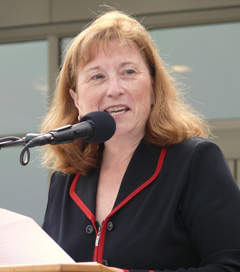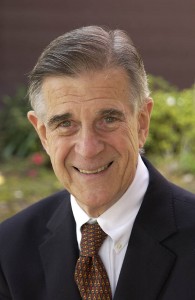
Ellen Corbett
She can, but only if she stop playing it safe.
Last October, in the midst of the 2012 electoral battle between veteran Congressman Pete Stark and Dublin City Councilman Eric Swalwell for Congressional District 15, California Senate Majority leader Ellen Corbett took the unprecedented step of announcing she would run for that seat in 2014.
Corbett had been angling to run for Stark’s seat, after he retired, for years. And there was much speculation that Stark would retire in 2012. He was in his 80’s, frequently in bad health, and had been marginalized in Washington. Furthermore, his district had been redrawn and he had lost much of the more liberal parts of western Alameda county, while gaining the conservative Tri-Valley area where his liberal policies were unlikely to be popular. Corbett already represented some of these areas – namely Castro Valley and Pleasanton – and her more moderate Democratic views would be an easier sell.
Stark, however, declined to do the “right thing” (for the local party, at least) and retire and while Corbett entertained the idea of challenging him, she eventually backed off. My guess is that labor would not support her against the aging incumbent.

Eric Swalwell
Her decision proved to be like manna from heaven for Eric Swalwell. The young Dublin City Council member had little to lose by taking on Stark. A prosecutor from a conservative Bay Area suburb, Swalwell was too young and had yet to pay enough dues to be taken seriously by the Democratic establishment or by labor. He had no support to lose by challenging the incumbent.
Swalwell, however, proved to be a consummate campaigner, willing to knock on door after door, attend event after event, and embrace the power of social media and new campaign technologies. He was also able to draw on the expertise of local politicos disaffected with Stark and the local Democratic party. Our own Mayor Stephen Cassidy, for example, shared his own tips and experience on defeating incumbents (he’d done it twice in San Leandro) while Swalwell’s former High School teacher and mentor Dublin Mayor Tim Sbranti, an upcoming political force himself, once again took him under his wing. It certainly didn’t hurt that Stark made some serious gaffes during early debates and then disappeared altogether from the campaign trail, leaving it all in the hands of his campaign managers and his supporters in labor and the Democratic party.

Pete Stark
Ultimately, it was the new open-primary system in California that gave Swalwell his win. After his surprisingly good showing in June, which put him in a one-to-one contest with Stark in November, Swalwell started drawing on support and money from more disaffected politicians and individuals. He became the new darling of the news media, which covered Stark’s gaffes with gusto. And he was able to make the race about personalities, rather than issues, which allowed him the flexibility of appealing to voters with very diverse ideologies.
By the end of the campaign, Swalwell had raised $826K and spent $800K of that. That still pales in comparison with the almost $1.4M Stark spent on this race, but it definitely made him competitive.
At the end of the day, in the November election, Stark’s incumbency held and he easily won the part of the district that he had historically represented, while Swalwell easily won the rest.
The question, of course, is what all of this means for Ellen Corbett. While nobody can predict the future, it’s helpful to look at the differences between Corbett and Stark and what she can and cannot bring to a Congressional campaign. Let’s also keep in mind that as everyone wants to back a winner, Corbett’s chances at winning are also dependent on the analysis politicos, contributors and voters make of those same chances. If people think Corbett has a shot, they are more likely to give her their support. And she will definitely need lots of it.
Ellen Corbett is not Pete Stark – in either the bad or the good ways. She is a calm, measured politician; she’s pleasant, smart, compassionate and empathetic, without being overly emotional. She is unlikely to make offensive statements on the campaign trail and give Swalwell the type of ammunition that he had with Stark. However, Corbett has been in public office for a couple of decades: first as a City Council member and Mayor of San Leandro, and then in the California Assembly and now California Senate. If Swalwell decides to run a negative campaign against her, he will probably be able to find plenty of things to criticize.
In 2012, Corbett’s advantages over Pete Stark were that her Senate district included most of CD 15 and that her views were more moderate, and thus more attuned to the voters. She’s always been a grass-roots politician, and knows the importance of one-to-one contact with voters. Voters have seen her at community events in their cities throughout the years. Since the district was redrawn, Corbett has also been seen in community events in those cities she does not currently represent: Dublin, San Ramon and Livermore.
In order to win, Corbett will have to make sure that the votes that went to Stark in 2010 now go to her and that the Democratic voters in Castro Valley and Pleasanton who voted for Swalwell, now vote for her instead. Of course, she will also have to make inroads with other Tri-Valley voters.
The first proposition should be the easiest. Southern Alameda county voters are used to seeing her name on their ballot and seeing her at events, and they may still be bitter about Stark’s loss. However, Swalwell is well aware of this and he is reaching out towards those parts of the district, attending events and trying to ingratiate himself with the local political establishment. He might have made a mistake by locating his district office in Pleasanton, however, as that sends a message that his heart is really in the Tri-Valley (plus it’s awfully inconvenient for voters in the southern part of the district to drive to Pleasanton), but Corbett is not helping herself either by keeping her district office in San Leandro.
Converting Swalwell voters to her is likely to be more difficult. While it’s true that many of the votes that Swalwell got were “anyone but Stark” votes, Corbett will need to make a case to the voters as to why she’s a better choice for them than the man they just put in office. Attacking his youth or inexperience did not work for Stark, so she will have to try to draw other distinctions.
So far the only message I’ve heard concerns Swalwell’s political stances. Rumors are being circulated that he has reached out to Blue Dog Democrats and to Republicans and that he is really a Republican in disguise (though that can also be said about President Obama). But rumors are just rumors and Swalwell is smart enough to know that it behooves him, at this point, to entrench himself within the Democratic party and follow Nancy Pelosi‘s lead. So far, all indications are that he’s doing just that. He has co-sponsored gun control legislation and the reauthorization of the Violence Against Women Act and he happily accepted being appointed an Assistant Whip, which means he is now responsible for making other Congress members fall into the Democratic party line. If Corbett wants to go after Swalwell on the issues, she will have to be ready to make strategic attacks on the party line.
One area in which Eric Swalwell and the Democratic leadership are particularly weak is the protection of civil liberties. Swalwell approves of the Patriot Act, going to war with Iran and has dodged questions about whether he supports US Presidents having the power to assassinate American citizens (which would imply that he does). Swalwell, moreover, has made it explicit that he doesn’t believe in a separation of Church and State and has suggested there is no place in government (or maybe even America?) for non-believers. While those positions may play well with his conservative base in both parties, they will make many voters on his district – both in the Democratic left and the libertarian right – very uncomfortable. Indeed, his support for gun control legislation is already losing him support in the Tri-Valley. Corbett could seize on this and develop a strong civil liberties agenda that would put all those voters in play. Indeed, this would also draw her closer to her potential colleagues to the north and south, Barbara Lee and Mike Honda, both staunch civil liberty advocates. That said, Corbett has not focused on civil liberties in the past and seems to be in favor of stronger federal gun control measures.
Corbett has two other big hurdles to clear: money and support. It’s almost impossible to win a Congressional campaign without money. Candidates need to put their names out there and that involves sending out mailers and putting out radio and TV ads, all of which are very expensive. A crafty candidate can save some money by manufacturing news events and getting free media coverage, but Corbett has not exhibited those media skills. Corbett started the year with only about $100K in her campaign account for Congress, that’s less than a tenth of what she will need in order to run a competitive race. And it’s not clear where her funds will come from. Her previous campaigns have been funded almost exclusively by PACs, so she doesn’t have a network of individual contributors on whom to rely on (by contrast, 85% of Swalwell’s contributions came from individuals). PACs, however, are unlikely to support her unless she can give them something that Swalwell can’t or won’t.
It’s also unclear how much support Ellen Corbett will be able to get from the Democratic party, labor and other groups. She is extremely entrenched within the local party, while Eric Swalwell has received the cold shoulder – at least publicly – from local politicos. But Corbett is not without her detractors: it’s hard to be in politics for so long without making enemies. She also has a reputation for not paying back her political debts, something which may come back to haunt her. She does, however, have a good shot at winning the party’s endorsement, though it’s definitely too early to know how that will play out.
Local Democratic insiders seem to be under the impression that Corbett’s gender will play in her favor. Some believe that Corbett will get the support of Nancy Pelosi because Pelosi wants to see more women in Congress. While I’m sure she has that goal in general, I will note that in 2011 she participated in fundraisers for Ro Khanna, who at the time was planning to run for CD 15 against Ellen Corbett. And if Swalwell falls into line, Pelosi would have no incentive to back Corbett – in particular, when there are plenty of more important races for her to concentrate on. It’s also doubtful whether Corbett will enjoy the support of Emily’s List, which also has more important races to focus on. Plus Swalwell has been playing it smart, not only did he co-sponsor re-authorization of VAWA but he joined the pro-choice caucus.
Even without overwhelming party support, Corbett is likely to have the support of the Alameda Labor Council. She has been faithful to labor for many years and chances are they will go to bat for her. However, it’s unlikely that the AFL-CIO will go against an incumbent Democratic candidate – in particular, if he doesn’t do anything to offend them – which could put local labor in a pickle. Without labor’s money and volunteers, her campaign is a non-starter.
Even with them, Corbett’s campaign has one additional problem: it has not embraced digital campaign technologies. As of this writing she doesn’t have a Facebook page, a Twitter account, a blog, a mailing list or even her own campaign website. This means that, at least online, the story of her campaign is being told by others (including me, if you search for “Ellen Corbett” you’ll see a link to San Leandro Talk). While in the digital age, it’s impossible for any politician to completely control their message; they still need to attempt to do so. And digital technologies not only allow politicians to interact with voters and maintain name recognition, but they also make it easier to run organized campaigns cheaply.
Swalwell knows all of this only too well. He has been tweeting out a storm (though he doesn’t respond to tweets), keeping up his Facebook page, posting videos on YouTube and making sure he’s seen everywhere. According to a recent tweet: “January by the numbers: 50 mtgs, 30 dist. events attended, 10 hearings, 200 guests from #ca15 for swearing-in & 9,000+ miles in the air.” He could have added his office issued 10 press releases in January, all available on his website (Corbett’s last press release is from September 2012). Moreover, Swalwell has been keeping the eyes of the media on him by hosting quirky events (e.g. “Ride with your Rep“) and vowing to try out one job held by people in his district every month.
One of the keys to Swalwell’s victory in 2012 was the support that he got from the news media, in particular San Francisco Chronicle’s Carla Marinucci and Bay Area Newspaper Group’s Josh Richman, who were happy to write about the many gaffes of Pete Stark. Stark’s personal arrogance and disrespect for the media had made him many enemies, of course. It will be interesting to see what type of coverage Corbett gets.
One final factor on this analysis are what other candidates might enter this race. It seems unlikely that any serious Democrats will throw their hat into this ring, but stranger things have happened. Ro Khanna, who raised over $1 million in anticipation of a run, has since transferred his ambitions towards a run in CD 13 against Mike Honda. If a serious moderate Republican entered the race, however, things could get complicated very quickly. Roughly 40% of the votes in CD 15 are conservative/Republican votes. Swalwell got all of these in November 2010, but he would likely lose a large percentage of them in June 2014 if a serious, well-funded Republican entered the race. If Corbett was able to hold on to Stark’s votes, it’s possible that Swalwell could be eliminated in June, sending her and the Republican candidate to November (when the 60% Democratic votes would give her a win). If I was Corbett, I would be looking hard through my Rolodex with anyone with an R by their name.
 At last weekend’s convention, the California Democratic Party issued a resolution calling for an end to extrajudicial executions and the unlawful use of drones. I wholeheartedly hope that Democratic politicians, both in California and other states, will put it into effect.
At last weekend’s convention, the California Democratic Party issued a resolution calling for an end to extrajudicial executions and the unlawful use of drones. I wholeheartedly hope that Democratic politicians, both in California and other states, will put it into effect.
 (
(


 ticle was originally published
ticle was originally published 